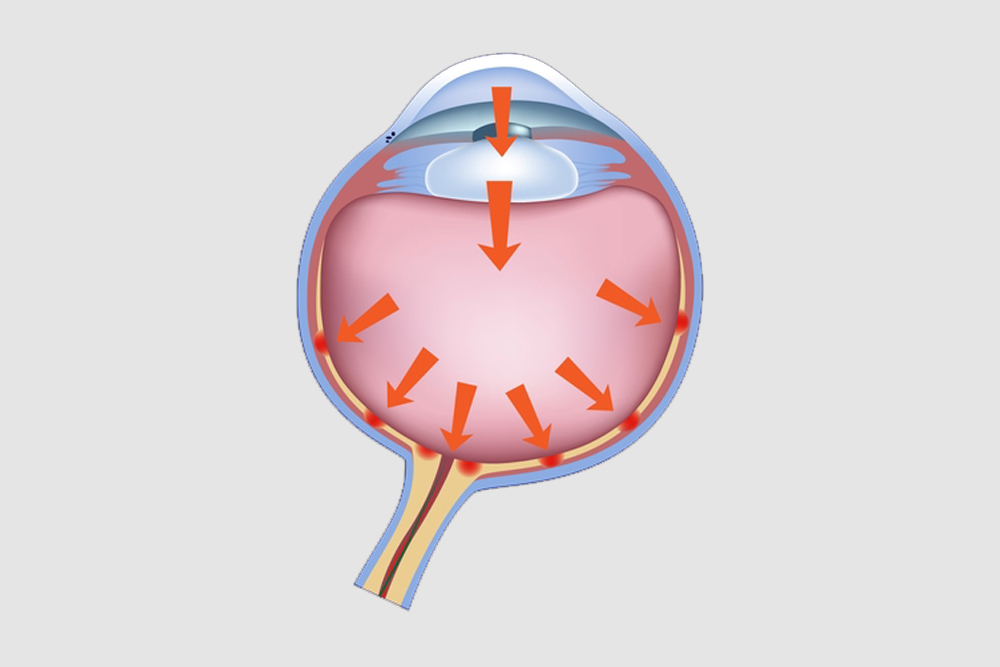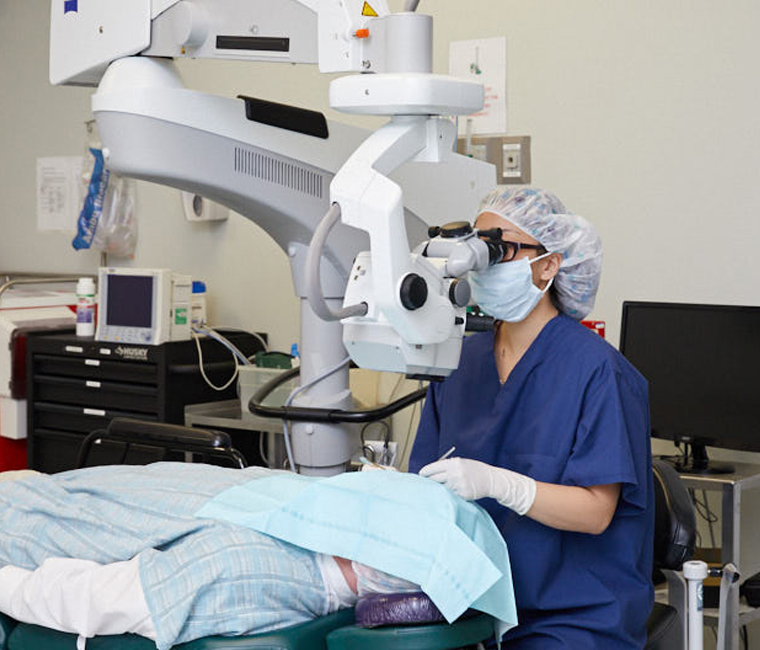Cataract care
A sustained fluid pressure on the optic nerve of the eyes causes glaucoma. In healthy eyes, the fluid (aqueous humor) flows through a mesh-like ‘channel’. The blockage of this channel causes glaucoma. The blockage itself may be caused due to a number of reasons like:
- Blockage of blood vessels in the eye
- Inflammation
- Inheriting the disease from a parent
- Chemical injury to the eye
- Physical injury to the eye
- Severe infection
Depending on the blockage type, glaucoma can be categorized as one of the two:
Open-angle glaucoma
Known as ‘wide-angle glaucoma’, this is the most common type of the two. In this case, the channel clogs over time which causes the increased pressure, while its drainage angle (where the cornea and iris meet) is normal.
Close angle glaucoma
Known as ‘angle-closure glaucoma’ or ‘narrow-angle glaucoma’, this type occurs when the iris narrows the drainage angle by bulging forward. The pressure is built suddenly when the pupil dilates (e.g., in a dark room) and blocks off most or all of the fluid drainage. This is known as a ‘glaucoma attack’. Ophthalmologists treat these cases as an emergency.
Who is at risk?
In a single word—everyone.
While older people are certainly at a higher risk for contracting glaucoma, children can contract this disease and be born with it, too. As the American Academy of Ophthalmology revealed, about 1 in every 10,000 babies born in America is born with glaucoma. This means that there is no age limit for the disease.
Apart from seniors, people with Jamaican or West Indian descent are also more susceptible to glaucoma as compared to Caucasians.
What are the Available Glaucoma Treatments?
Depending on the severity of glaucoma, it can be treated in various ways. Typically, eye specialists prescribe drops or pills as open angle glaucoma treatment, but when the medication doesn’t work or the eye does not tolerate it, they recommend a glaucoma surgery.
There are two types of surgeries for treating glaucoma:
1. Laser surgery
Eye specialists recommend this glaucoma treatment when damage occurs to the optic nerve and/or when the pressure is critically high. In glaucoma laser surgery, a focused beam of light is used to create small openings in the eye tissue, allowing the aqueous humor to circulate easily. Examples of this type of surgery include:
- Argon Laser Trabeculoplasty (ALT): This involves an argon laser beam opening the fluid channels of the eye, easing the drainage. This method lowers the risk of increased pressure post-surgery. Doctors typically prescribe ALT for patients with open angle glaucoma.
- YAG Laser Peripheral Iridotomy (LPI): Ophthalmologists often recommend this procedure for patients with closed angle glaucoma. This surgery makes a small hole in the iris to increase the drainage angle back to the normal level.
How long does a laser surgery take? Is it painful?
A laser surgery takes about 5-10 minutes, and is completely painless. However, there may be a light stinging sensation.
What is the recovery time for laser surgery?
The recovery time for this surgery is quite short. You can go home right after your surgery. Your vision may become a bit blurred, but it will go away in a day or two. Doctors suggest follow ups depending on individual case types.
What is the success rate for laser surgery?
The success rate of laser is quite high (75% for ALT) but not as high as that for trabeculectomy.
What are the precautions and postoperative care for laser surgery?
- Do not rub your eye(s)
- Do not wear eye makeup for at least a week after surgery
- Follow your ophthalmologist’s instructions about getting into swimming pools or hot tubs
- Take any prescribed medication religiously
- Wash your hands before using eye drops
- Wear sunglasses to protect your eyes
If your eye becomes red or starts to irritate, seek professional help immediately.
2. Incisional surgery
When the laser surgery does not work, eye specialists may recommend trabeculectomy. Small incisions are made in this glaucoma treatment to create new channels for fluid drainage.
How long does an incisional surgery take? Is it painful?
This type of surgery can take about 20-30 minutes. It isn’t painful, either, because the eye is anaesthetized during the surgery.
What is the recovery time for trabeculectomy?
The recovery time for this surgery is higher than laser. Your doctor might recommend you several eye drops to prevent infection and reduce inflammation. This can take a few months.
What is the success rate for trabeculectomy?
The success rate of trabeculectomy at five years is 80%.
What are the precautions and postoperative care for trabeculectomy?
- Always wash your hands before using the eye drops, and avoid touching the tip to your eye
- Avoid bending over or lifting heavy objects
- Avoid strenuous physical activities
- Do not use eye makeup like eye pencil or kohl
- Protect the eye from external injury
- Use medication as recommended by your doctor
- Wear UV sunglasses during the day
Glaucoma Treatment in New Jersey
Due to the silent nature of this blindness-inducing disease, it is vital that you make glaucoma testing a part of your yearly routine health screenings. If you have a family history of glaucoma, you should have it on more frequent intervals. The New Jersey Eye Center boasts of a Glaucoma Specialist on staff for more than 25 years. In addition, all patients examined at the eye center are tested for glaucoma.
If you’re looking for glaucoma treatment in New Jersey, our glaucoma doctors, can provide medication, and perform both laser and incisional surgeries when required. For the ease of our patients, our eye center is open six days a week. Please feel free to contact us if you have any queries related to glaucoma treatment.
We would be happy to help.



